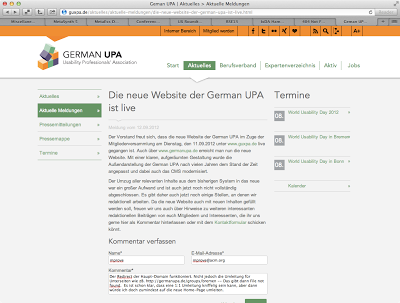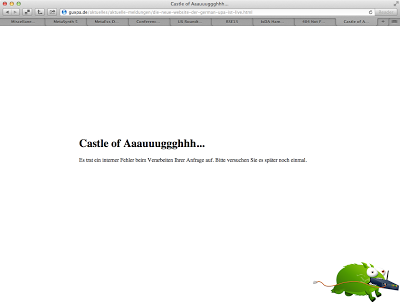“The new equation is less stuff and less space equals small footprint, more money, and more happiness”
Author: mprove
Jesse Schell at LongNow Seminars
Yet another wow presentation from LongNow. Jesse Schell talks how technological progress inevitably(!?) leads to a gamified life.
Jesse Schell: Visions of the Gamepocalypse (1 55′ full version with chapter markers) from The Long Now Foundation on FORA.tv
Mentioned in the talk: Christopher Alexander’s 15 Elements of Style
à propos
TEDxTUHH
How exciting, my 3rd TEDx conference. Actually the 4th in Hamburg, but this time it was organized by students of the Technical University of Hamburg-Harburg rather than TEDxHamburg by red onion. Now TEDxTUHH on 10.11.12. [a pun is weak if you have to explain it, but this is 10-Nov-2012.] A good mix of almost 100 people listened to a good lineup of speakers and three TED videos. My personal highlights (just bullets, no numbers):
- Manuela Maurer von Hundebande [gang of dogs] – female prisoners on Hahnöfersand train guide dogs. Manuela’s project is inspired by the German movie Underdogs, which is based on Puppies Behind Bars. Everything is deeply intertwingled.
- Clemens Triebel from younicos – In his research lab in Berlin Adlershof he builds a complete green power supply for an island at scale 1:5. The magic trick is the largest battery in the world to guarantee a constant power level under all simulated weather conditions.
- Ali Jelveh from protonet – talking about choice. You have to have a choice by all means because with out choice you are powerless, and depend on others and on the system. No surprise that Ali develops an alternative infrastructure to the internet. I was delighted to meet again with Seda and Ali after his talk at RSE10.
- Very entertaining was Benjamin Zander’s TED talk The transformative power of classical music.
The crew around Nils Hackius did a splendid job. I am impressed by the professional setting, and yet –compared to TEDxHamburg in the Curio House– not too slick and with out stylish glamour. Simple, effective, friendly – just a great show.
Last not least, a few impressions from TEDxTUHH. -enjoy.
Trust
I sense traffic of this blog w/o a present reason. Hmm. What about this, brief musings about trust:
Each software, each website, each social platform, each community building effort is a matter of trust building. You make a social promise to continue the effort, and to care for the commitment of the users or community members.
It is easy to offer more to your community. On the other hand, it is quite difficult or impossible to take something away, or to close down or end the product or community without disappointing someone.
cheers,
Matthias
Apocalyptic Punk
Deus Ex Machina from Seth C Brown on Vimeo.
In this movie a man shares his passion and aspiration towards making his own motor bike. Ultimateley the bike is not that easy to drive. Nonetheless, the pride and satisfaction of creating this apocalyptic thing is epic.
germanupa.de > guxpa.de
Sight
Sight from Sight Systems on Vimeo.
Wim Wenders Bootleg
Eigentlich schleicht man sich ja mit einem Tonbandgerät in Konzerte, um diese heimlich mitzuschneiden. Zumindest war das der Plot von Diva. 30 Jahre nach Diva hatte ich nun das Vergnügen eine Veranstaltung mit Wim Wenders zu erleben, der über seine zweite Profession – das Photographieren – philosophierte.
Mit freundlicher Genehmigung von wendersimages und der Deichtorhallen Hamburg veröffentliche ich die Aufzeichnung vom 30. Mai 2012 nun im uxHH Radio.
– enjoy
Radio Days Are Back
Dear User Experience Forum,
it has been quite a while since our last newsletter. Lot’s of things are happening around us, and we are one of the significant forces to shape the present and future. At least we should! User Experience matters. More than ever.
At interaction|12 I had a chat with a next gen PhD student. Well, “next gen” is of course relative to my point in life. He was very enthusiastic about the possibilities of all the new mobile devices. According to him, now is the time to apply design to technology, as opposed to the eighties of the previous century, when engineers built the desktop systems. – Hmm, he was right and wrong. Times are exciting. They have always been. But human factors, software ergonomics, human interface design, usability, information architecture, interaction design, design thinking, service design, user experience, …, are not new at all. It is no surprise that your products, sites, and services are much more successful once you start with the user in the center of the design considerations.
Oops, I wanted to write about something else. So please take my preaching above as a preface.
Radio days are back!
Should I tell the story chronologically, or are you already used to think backwards like in blogs, micro-blogs, and activity streams? All the reverse navigation structure really bothers me, because it is the only option. [at this point, imagine the results of a design workshop about alternative visualizations of time based content.] I will tell the story the old fashioned way.
Once upon a time… :o) I bought an mp3 player in the US; in fact I ordered it to be delivered to a friend in San Francisco. Later Jo told me the story how the FedEx guy presented the package to him, “Hello! Your new Apple iPod Nano has arrived!!” Isn’t it astounding that even unrelated employees spread the joy about certain products?
Years later, and a few months ago, Apple informed me that my Nano could catch fire, and they offered another Nano in exchange. This is bitter & sweet, because the product design of the first generation Nano, and the story how the device came into my possession made it so special that I did not want to send it back to Apple. – I did it anyway and received the latest model in return. I still do not like it very much. Though, I can listen to FM radio and connect it with my sneakers!? Just one new feature is the reason for me not to abandon the Nano and get an original Nano back from eBay: I discovered Voice Memo. But it I took me a while until I figured out that a microphone has to be connected to the jack for the ear phones to start recording.
I rarely talk to myself – and thinking-aloud should be reserved for other situations. Instead I record sessions from our local UX community in Hamburg with the intend to publish a podcast. Again, this sounds easier than it was. OK, a podcast is basically an RSS feed with links to the episodes. Now what? How to prepare the audio files in an appropriate quality? Where to store the files? How to create the feed?
I found a few good tutorials online, and looked behind the curtain of other podcasts like the BayCHI Podcasts, The LongNow Seminars, Jan ‘s IATV Radio, and Tobi’s Einschlafen Podcast.
And here it is [drum roll] the uxHH Radio at uxhh-radio.blogspot.de.
The recent three episodes happen to be English sessions. We have
- Karen MacGrane, Bond Art + Science, New York, about flexible content for mobile devices
- Josh Clark, Global Moxie, New York, about the 7 deadly myths of mobile, and
- Darius Kumana, ThoughtWorks, London, about Getting Beyond Good Enough – the marriage between agile and UX.
Previous episodes are taken from HyperKult in Lüneburg and my Raum Schiff Erde unconferences in Hamburg. I might add other (bootleg) recordings as well, but I will stick to UX in the Northern part of Germany.
I hope you tune in and find inspiration by one of the podcasts mentioned above.
Or let us know your favorite channel.
thanks for listening!
Matthias
Ted Nelson: Computers for Cynics
Two Five Seven Eight new Ted Nelson videos are up: Computers for Cynics
#0 The Myth of Technology
#1 The Nightmare of Files and Directories
#2 It All Went Wrong at Xerox PARC
#3 Database
#4 The Dance of Apple and Microsoft
#5 HyperHistory
#6 The Real Story of the World Wide Web
#N Closure: Pay Attentions to the Man Behind the Curtain




